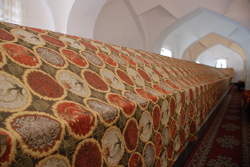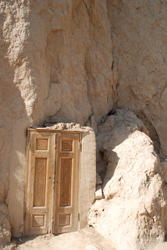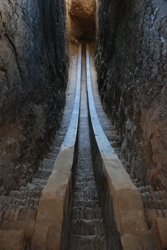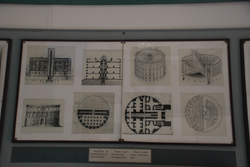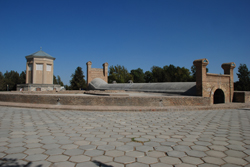Samarkand: I Like Ulugbek
9 October, 2008, 03:16 am in "Uzbekistan"
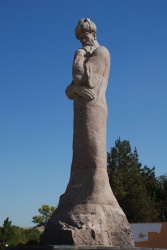 The Tomb of Daniel is considered to be a holy place by 3 religions. However, truth be told, it is a little silly. Due to a belief that Daniel's body grows, the stone above the tomb is 8 meters long. I'd say “stone sarcophagus” but I read that the bodies aren't actually kept inside the stones but buried in crypts underneath. Anyway, I don't think they are still enlarging the stone, but it is a tight fit in the tomb. The tomb was built in 1900. Next to the tomb are some hills/cliffs of mud which might be old Samarkand's walls. One had an ornate door in it but it was locked.
The Tomb of Daniel is considered to be a holy place by 3 religions. However, truth be told, it is a little silly. Due to a belief that Daniel's body grows, the stone above the tomb is 8 meters long. I'd say “stone sarcophagus” but I read that the bodies aren't actually kept inside the stones but buried in crypts underneath. Anyway, I don't think they are still enlarging the stone, but it is a tight fit in the tomb. The tomb was built in 1900. Next to the tomb are some hills/cliffs of mud which might be old Samarkand's walls. One had an ornate door in it but it was locked.Ulugbek's observatory was much more appealing to my rational mind. What remains is the huge marble track for a giant sextant. Surrounding it are tall brick walls all of which is enclosed in a narrow building. The area at the top of the track is circular with brick walls showing where I guess other instruments went. The park is built at the level of the top of the sextant ramp. There is a small but informative museum showing miniatures (mainly copies) as well as photos of sites and a few artifacts related to Ulugbek and the time period. There are some prints of what the observatory looked like as well as copies of tables of figures and calculations conducted by Ulugbek.
An interesting quote from Ahtuan Gobil in the 18th Century recalled, “Lamas and Tibetan priests have an ancient astronomy book. All that Chinese learned in the area of this science came from the West Samarkand outskirts.”
I know very little about Ulugbek but he sounds pretty interesting as far as rulers go. He was a scientist, mathematician, and philosopher. He built the Ulugbek medressa (school) between 1415 and 1420 in what is now Registan as well as a series of other buildings there (none of which remains). He built a couple other medressas as well. Eventually he was killed by religious fanatics (possibly his son) who didn't appreciate his scientific take on things, I guess.
I know very little about Ulugbek but he sounds pretty interesting as far as rulers go. He was a scientist, mathematician, and philosopher. He built the Ulugbek medressa (school) between 1415 and 1420 in what is now Registan as well as a series of other buildings there (none of which remains). He built a couple other medressas as well. Eventually he was killed by religious fanatics (possibly his son) who didn't appreciate his scientific take on things, I guess.
Comments
- Comments
Powered by My Blog 1.69. Copyright 2003-2006 FuzzyMonkey.net.
Created by the scripting wizards at FuzzyMonkey.net..
(Code modified by Rowshan Dowlatabadi)
Created by the scripting wizards at FuzzyMonkey.net..
(Code modified by Rowshan Dowlatabadi)


